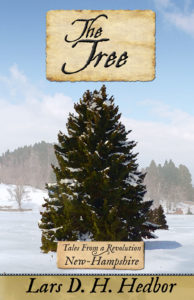On Writing About the American Revolution
A Guest Post by Lars D. H. Hedbor
I’m often asked why I write about the American Revolution. It is true that here are many fascinating and compelling eras in human history. Indeed, when I reach the end of my explorations of the Revolution, I expect to broaden my scope.
 There is Opportunity in Writing About the American Revolution
There is Opportunity in Writing About the American Revolution
In part, I started writing about the Revolution because of the opportunity—there are a lot of fascinating small stories that contributed to the big events of the Revolution, and few of them have been explored in fiction. Having a wide, uncrowded field in which to work is hugely appealing.
Too, the events of the Revolution are familiar (if imperfectly), so I’m not having to explain to my readers that the Americans fought the British to achieve independence. They open my books knowing that much. The details and nuances, though, make terrific grist for my imagination.
Then there is the opportunity to remind readers that history is shaped by the small decisions of ordinary people. The Revolution was not accomplished by just a few heroic figures striding across the pages of history atop mighty white horses. Critical events were shaped at the kitchen tables of folks who would never make it into our histories. I take my readers to those kitchen tables and let them imagine what choices they might have made—and reflect on how they may affect history with their choices today.
The American Revolution Changed Humanity
Most importantly, though, I write about the Revolution because it changed the course of human history. It is unique in that it was not fought over the question of which prince would rule over a patch of dirt. The American War of Independence was as much a philosophical revolution as it was a military one. It reframed the very concept of governance—the whole relationship between the people and their leaders.
With the Revolution, we emerged from being subjects of the King to becoming citizens of the Republic. We were no longer ruled under divine right, but are led by men and women of our own choosing. It has become fashionable to focus solely on the imperfections of the Revolution—which were many and about which I write unflinchingly. However, thinking only about what the Founders got wrong tends to overlook how much they got right.
This magnificent accomplishment, which took a scattered collection of hardscrabble colonies and united them as one of the leading nations of the world, is well worth understanding deeply. That is why I write about the American Revolution, and will do so for some time to come.
Lars D. H. Hedbor is the author of the Tales From a Revolution series, each of which explores the Revolution as it unfolded in a different colony or future state. His most recent release is The Tree: Tales From a Revolution—New-Hampshire, which follows a young man as he is abruptly orphaned, and is left to manage his father’s timber grants with only the help of his eccentric aunt. He finds comfort in a new friendship with Betty, a decidedly odd neighbor. Defying the Royal Governor’s crackdowns and his aunt’s commands, Abe makes choices that put him on a collision course with both. With rebellion in the air, Abe must escape detection by the Governor’s agents and solve the puzzle of Betty’s past in order to secure his future.
The Tree is available in ebook, paperback, and audiobook. You can learn about all of Hedbor’s books on his website, LarsDHHedbor.com.
. . . . . . . . . . . . . . . . . . . . . . . . . . . . . .
Thanks for sharing in the spirit of learning about our collective American History by subscribing to the blog. Guest posts like this one are welcomed and encouraged––by academics, historians, authors, artists, and storytellers. Contact me for details.
For Karen-related author research tidbits, book news and events, subscribe to my e-publication, CHASING HISTORIES.
